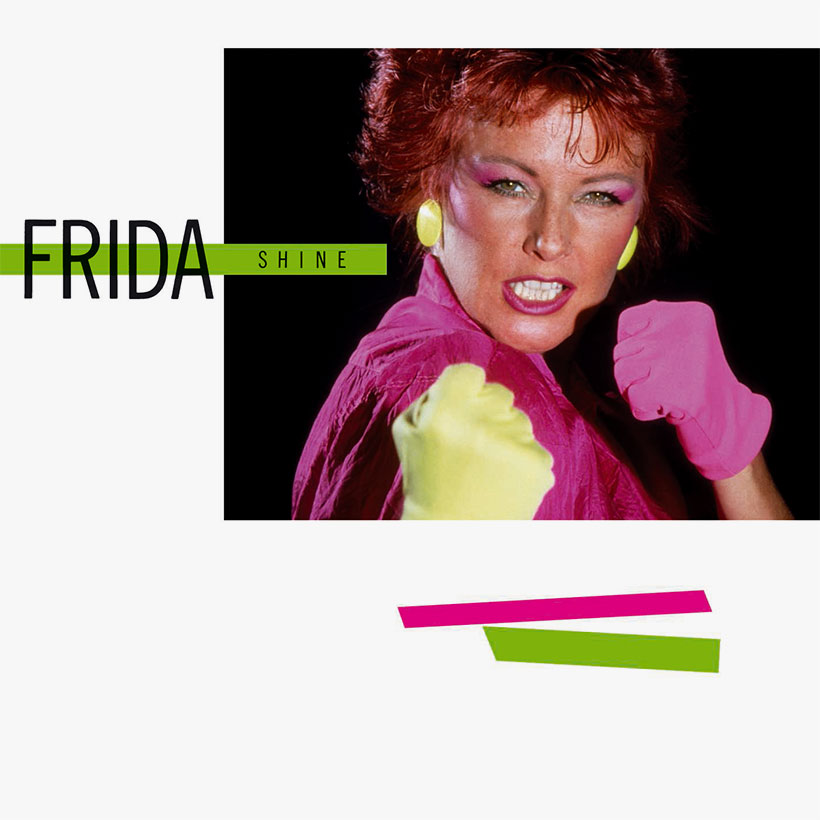Between the recording of Shine in Paris, during the spring of 1984, and the album hitting the shops on September 11 that year, what it meant to be a successful female pop act was being spectacularly redefined by the colossal success of Madonna. Overnight, it seemed like the moment had passed for scores of female artists. But though the landscape had changed irrevocably in the 18 months since the release of Something’s Going On, Frida was trying to create a thoroughly of-the-moment pop-rock album that would be even more ambitious than her last.
Phil Collins had again been approached to manage the production, but his day job with Genesis (and a hugely successful solo career) was keeping him otherwise engaged, so U2 and Simple Minds producer Steve Lillywhite was drafted in. His harder rock edge would sharpen the edges of Frida’s melodious pop voice, bathing the 10 tracks in a widescreen depth that was ambitious and, at times, demanding.
The song choices also pushed the boundaries of what you might expect to hear from a former member of ABBA. Once again, a range of writers contributed to the album (with Lillywhite’s wife, the late Kirsty MacColl, securing a credit on three of the songs). “Slowly” was a new composition from Frida’s former bandmates Benny and Björn, and offers Shine’s most familiar moment. With the trademark harmonies punched up to the fore, it’s another fine example of the pair’s extraordinary gift for songwriting. The contrast with a track like “Twist In The Dark,” a dense midtempo number surprisingly lifted as a single in some territories, couldn’t be greater.
Frida Twist in the Dark (promo) 1984
Click to load video
In most markets, the electric title track was picked as the lead single, but its chart performance was modest. The power ballad “Come To Me (I Am Woman),” which was written by Eddie Howell and David Dundas of Jeans On fame, was swiftly promoted in some European territories but wasn’t the success it should have been; it was left to TV star Su Pollard to finally take the song into the UK charts when she scored a minor hit with it in October 1985. Big Country’s late frontman, Stuart Adamson, contributed the album’s only other 45, “Heart Of The Country,” issued in the UK. It’s strikingly reminiscent of Big Country’s work on The Crossing, which had done so well internationally a year earlier. Again, Lillywhite had performed production duties on that disc, further strengthening the collaborative vibe of the whole Shine project.
Respected songwriter Simon Climie (later to find fame as one half of Climie Fisher) contributed “One Little Lie” and the jaunty “Chemistry Tonight” (the latter a co-write with MacColl and the Alison Moyet collaborator Pete Glenister, who would pen the album’s haunting closing track, “Comfort Me”).
“Don’t Do It” is credited entirely to Frida, and this yearning ballad offers another highlight, echoing the work she did in the band that made her a global star. This warm, lilting song would certainly have helped gain the album wider exposure had it been given a greater airing, but it’s perhaps indicative of the whole mood back then that it was kept in the shadows. What’s hard for us to appreciate now is that, in the middle of the 80s, the world wasn’t showing enough appreciation for ABBA’s craft, and even the band members seemed to distance themselves from the success they had achieved.
In Frida’s case, what came next was a long break from the demands of a solo career, with occasional projects and the odd live appearance punctuating more than a decade away from the limelight. Shine only made a handful of European charts, and when Frida returned with a new album, Djupa Andetag, in 1996, it was recorded in her native language and was a substantial hit in her homeland.
Talking about Shine in a 2005 retrospective, Frida says she thought the album had pushed things a little too far, but it’s a lively, compulsive collection that, while of its time, more than stands up today. If a certain American superstar had recorded the powerful title track back in 1984, doubtless we’d still be hearing it played, 30-odd years later.
Listen to the best of ABBA on Apple Music and Spotify.



